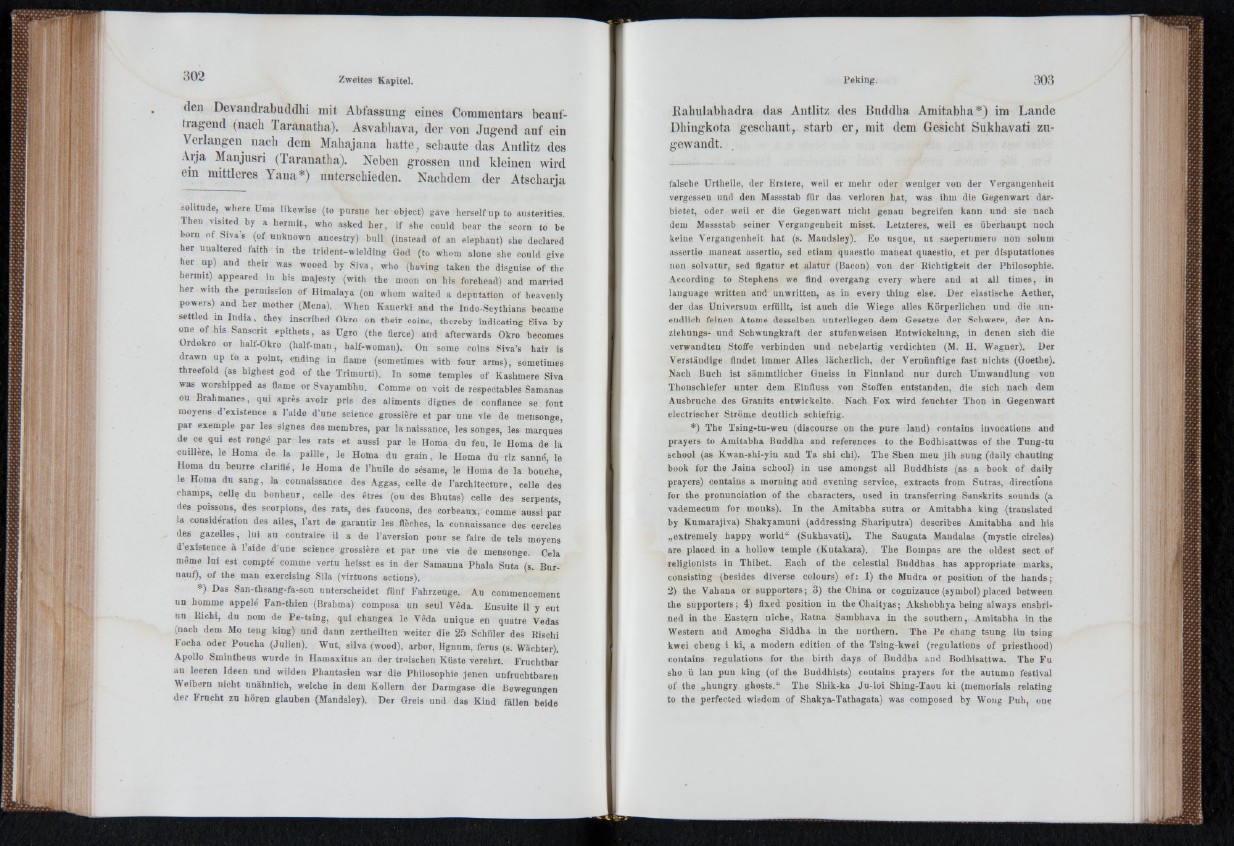
den Devandrabuddhi mit Abfassung eines Commentars beauftragend
(nach Taranatha). Asvabhava, der von Jugend auf ein
Verlangen na,ch dem Mahajana hatte, schaute das Antlitz des
Arja Manjusri (Taranatha). Neben grossen und kleinen wird
ein mittleres Yana*) unterschieden. Nachdem der Atscharja
solitude, where Uma likewise (to pursue her object) gave herself up to austerities.
Theu visited by a hermit, who asked he r, if she could bear the scorn to be
born of Siva’s (of unknown ancestry) bull (instead of an elephant) she declared
her unaltered faith in the trident-wielding God (to whom alone she could give
her up) and their was wooed by Siva, who (having taken the disguise of the
hermit) appeared in his majesty (with the moon on his forehead) and married
her with the permission of Himalaya (on whom waited a deputation of heavenly
powers) and her mother (Mena). When Kanerki and the Indo-Scythians became
settled m In d ia , they inscribed Okro on their coins, thereby indicating Siva by
one of his Sanscrit epithets , as Ugro (the fierce) and afterwards Okro becomes
Ordokro or half-Okro (half-man, half-woman). On some coins Siva’s hair is
drawn up to. a point, ending in flame (sometimes with four arms), sometimes
threefold (as highest god of the Trimurti). In some temples of Kashmere Siva
was worshipped as flame or Svayambhu. Comme on voit de respectables Samanas
ou Brahmanes, qui après avoir pris des aliments dignes de confiance se font
moyens d existence a l’aide d’une science grossière et par une vie de mensonge,
par exemple par les signes des membres, par la naissance, les songes, les marques
de ce qui est rongé par les rats et aussi par le Homa du feu, le Homa de la
cuillère, le Homa de la paille, le Homa du grain, le Homa du riz sanné, le
Homa du beurre clarifié, le Homa de l’huile de sésame, le Homa de la bouche,
le Homa du sang, la connaissance des Aggas, celle de l’architecture, celle des
champs, celle du bonheur, celle des êtres (ou des Bhutas) celle des serpents,
des poissons, des scorpions, des rats, des faucons, des corbeaux,' comme aussi par
la considération des ailes, l’art de garantir les flèches, la connaissance des cercles
des gazelles, lui au contraire il a de l’aversion pour se faire de tels moyens
d existence à l’aide d’une science grossière et par une vie de mensonge. Cela
meme lui est compté comme vertu heisst es in der Samanna Phala Suta (s. Bur-
nauf), of the man exercising Sila (virtuons actions).
*) Das San-thsang-fa-sou unterscheidet fünf Fahrzeuge. Au commencement
un homme appelé Fan-thien (Brahma) composa un seul Vêda. Ensuite il y eut
un Richi, du nom de Pe-tsing, qui changea le Vêda unique en quatre Vedas
(nach dem Mo teng king) und dann zertheilten weiter die 25 Schüler des Rischi
Focha oder Poucha (Julien). Wut, silva (wood), arbor, lignum, ferns (s. Wächter).
Apollo Smintheus wurde in Hamaxitus an der troischen Küste verehrt. Fruchtbar
au leeren Ideen und wilden Phantasien war die Philosophie jenen unfruchtbaren
Weibem nicht unähnlich, welche in dem Kollern der Darmgase die Bewegungen
der Frucht zu hören glauben (Mandsley). Der Greis und das Kind fallen beide
Rahulabhadra das Antlitz des Buddha Amitabha*) im Lande
Dhingkota geschaut, starb er, mit dem Gesicht Sukhavati zugewandt.
falsche Drtheile, der Erstere, weil er mehr oder weniger von der Vergangenheit
vergessen und den Massstab für das verloren hat, was ihm die Gegenwart darbietet,
oder weil er die Gegenwart nicht genau begreifen kann und sie nach
dem Massstab seiner Vergangenheit misst. Letzteres, weil es überhaupt noch
keine Vergangenheit hat (s. Maudsley). Eo usque, u t saeperumero non solum
assertio maneat assertio, sed etiam quaestio maneat quaestio, et per disputationes
non solvatur, sed figatur et alatur (Bacon) von der Richtigkeit der Philosophie.
According to Stephens we find overgang every where and at all times, in
language written and unwritten, as in every thing else. Der elastische Aether,
der das Universum erfüllt, ist auch die Wiege alles Körperlichen und die un endlich
feinen Atome desselben unterliegen dem Gesetze der Schwere, der An-
ziehungs- und Schwungkraft der stufenweisen Entwickelung, in denen sich die
verwandten Stoffe verbinden und nebelartig verdichten (M. H. Wagner). Der
Verständige findet immer Alles lächerlich, der Vernünftige fast nichts (Goethe).
Nach Buch ist sämmtlicher Gneiss in Finnland nur durch Umwandlung von
Thonschiefer unter dem Einfluss von Stoffen entstanden, die sich nach dem
Ausbruche des Granits entwickelte. Nach Fox wird feuchter Thon in Gegenwart
electrischer Ströme deutlich schiefrig.
*) The Tsing-tu-weu (discourse on the pure land) contains invocations and
prayers to Amitabha Buddha and references to the Bodhisattwas of the Tung-tu
school (as Kwan-shi-yin and Ta shi chi). The Shen meu jih sung (daily chauting
book for the Jaina school) in use amongst all Buddhists (as a book of daily
prayers) contains a morning and evening service, extracts from Sutras, directions
for the pronunciation of the characters, used in transferring Sanskrits sounds (a
vademecum for monks). In the Amitabha sutra or Amitabha king (translated
by Kumarajiva) Shakyamuni (addressing Shariputra) describes Amitabha and his
„extremely happy world“ (Sukhavati). The Saugata Mandalas (mystic circles)
are placed in a hollow temple (Kutakara). The Bompas are the oldest sect of
religionists in Thibet. Each of the celestial Buddhas has appropriate marks,
consisting (besides diverse colours) of: 1) the Mudra or position of the hands;
2) the Vahana or supporters; 3) the China or cognizauce (symbol) placed between
the supporters; 4) fixed position in theChaityas; Akshobhya being always enshrined
in the Easte_rn niche, Ratna Sambhava in the southern, Amitabha in the
Western and Amogha Siddha in the northern. The Pe chang tsung lin tsing
kwei cheng i ki, a modern edition of the Tsing-kwei (regulations of priesthood)
contains regulations for the birth day? of Buddha and Bodhisattwa. The Fu
sho ü lan pun king (of the Buddhists) contains prayers for the autumn festival
of the „hungry ghosts.“ The Shik-ka Ju-loi Shing-Taou ki (memorials relating
to the perfected wisdom of Shakya-Tathagata) was composed by Wong Puh, one